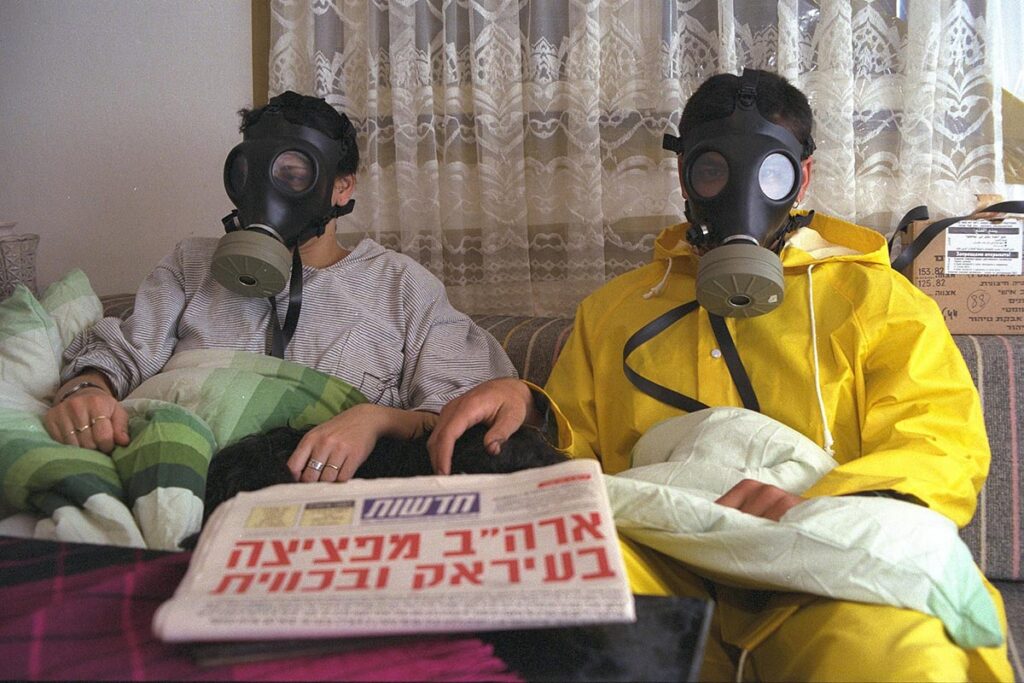Do you remember 1991?
OK, maybe you weren’t born yet. But for me, 1991 was the best year! Michael Jordan won his first NBA championship and Nirvana released the greatest album of all time. (OK, maybe top 3). But things were a little less rosy over in Israel. Because the tiny state was pulled into a massive mess by a country 600 miles away. A mess that had the government handing out gas masks to every man, woman, and child in anticipation of a chemical war.
What in the world would make the government do that?
Well, to answer that, let me introduce you to this charming fellow. This is Iraqi dictator Saddam Hussein. In 1991, Hussein was in a tough spot. I’m talking 34 countries allied against him. So in response, he attacked one of the few Middle Eastern countries that had stayed out of the war: Israel. Logical, right? So let’s break it down.
Why did Saddam attack Israel, which wasn’t involved in the war at all? Why were Israelis queueing up for gas masks? And how did Saddam’s attack on Israel end up changing the nature of the conflict between Israelis and Palestinians?

To understand what happened in 1991, we’ve got to rewind to 1979, when Saddam Hussein officially took control of Iraq. His first major foreign policy move as head of state? Invading his neighbor, Iran. The two countries had been sniping at each other for years. But when the Iranian Revolution swept Iran, leaving the country wobbly and unstable, Saddam seized his chance.
He attacked Iran in 1980, dragging both countries into a war that lasted eight years, cost more than $1 trillion dollars, took an estimated 1 million lives, and did absolutely nothing to change the borders of either country. But it did set the stage for another war.
Saddam financed his war on Iran by borrowing billions from wealthy Gulf States. But when the war ended in 1988, he didn’t feel like paying them back. So he did what all sane, rational people do to get out of debt. On August 2, 1990, he invaded Kuwait.
The world was not pleased with this state of affairs. But Saddam ignored the economic sanctions and arms embargoes and even the UN Resolution demanding he withdraw from Kuwait. So 34 countries, including a big chunk of the Arab world, got together for Plan B: war.
In response, Saddam threatened Israel — one of the few Middle Eastern countries that wasn’t part of the coalition against him. Why? Let’s get the obvious answer out of the way: Antisemitism. (Why is it always antisemitism?!)
For over two thousand years, Iraq was home to a huge and thriving Jewish community. But during WWII, Iraq cozied up to the Nazis. In 1941, a two-day pogrom known as the Farhud devastated the Jewish community in Baghdad.
Things only got worse from there. By the 1950s, nearly all of Iraq’s Jews had fled their homes due to intense persecution. But Saddam was motivated by something even stronger than his hatred of Jews: his bruised pride. Which brings us to the second reason Saddam had it out for Israel.
Iraq had a thing for joining other Arab countries when they attacked Israel. Seriously, look where Israel is, and look where Iraq is. Yet Iraq supported Israel’s neighbors in their war against Israel in 1948…and 1967… and 1973. The Arab states lost to tiny little Israel every time. Ouch. Well, 1973 is a complicated one — check out our podcast on the Yom Kippur War to learn more:
And things got even more embarrassing for Saddam in 1981, when Israel destroyed the Iraqi nuclear reactor at Osirak. In under two minutes, Saddam’s dream of a nuclear Iraq went up in smoke. (Pun intended.) Again…ouch.
But Saddam’s third reason for attacking Israel was a little more politically savvy. He really hated that Arab states had joined the US-led coalition against him in 1991. He figured that if he attacked Israel, Israel would respond. Then the Arab states would have two options. One: they’d pull out of the coalition entirely because heaven forbid they’d fight on the same side as Israel. Or, two: maybe they’d even switch sides and join him!
Either way, Saddam hoped that attacking Israel would turn the war in his favor. He even suggested that he’d leave Kuwait if Israel would withdraw from what he called “occupied Arab territory.” No one really believed him. But the Palestine Liberation Organization, headed by Yasser Arafat, appreciated Saddam’s posturing.
So the PLO broke with the majority of the Arab world and sided with Iraq against the American-led coalition. Which turned out to be a bad move, and not just because Saddam was a genocidal dictator. I’ll explain why in a minute. Stick with me.
So where were we? Ah, yes. Saddam’s promise to “make fire eat up half of Israel” and his assertion that “I consider every city in Israel a target.”
This wasn’t an empty threat. Saddam had already committed genocide. Throughout the 80s, he’d slaughtered Iraq’s Kurdish population using conventional and chemical weapons, and it was strongly suspected that he had some nasty bioweapons in his arsenal. What would you have done if you were Israeli Prime Minister Yitzhak Shamir?
Shamir had spent his life fighting for Israel. He’d been a high-ranking commander in the Lehi — the most hardline of Israel’s pre-state paramilitaries — and he was a strict devotee of Israeli military doctrine, which demanded a strong, and preferably pre-emptive, response to any threat.
But now, Shamir was stuck between a rock and a hard place, or Scylla and Charybdis for my fellow Greek mythology nerds out there. Israel takes genocidal threats really seriously. If Shamir didn’t respond, Israelis would end up sitting in bomb shelters, waiting for bioweapons to rain down from the sky. But if Shamir did respond, the US-led coalition against Iraq would fall apart, and the war would get a whole lot nastier.
Shamir didn’t have a lot of time to deliberate. But his first responsibility was to his citizens, so the government distributed atropine auto-injectors and gas masks along with strict instructions to keep them close at all times. Families learned how to seal their homes with plastic sheeting and tape in the event of a chemical attack. How to put a gas mask on their babies.
The US-led coalition attacked Iraq on January 17, 1991. Two days later, Saddam sent his first Scud missiles towards Israel. Night after night, sirens called Israelis to their bomb shelters. And as the missiles rained down on Haifa and Tel Aviv, Israelis from across the political spectrum agitated for their country to defend itself.
The literary critic and scholar Dan Miron published a searing article titled “If there is an IDF, let it appear!” — a pointed reference to “In the City of Slaughter,” Hayim Nachman Bialik’s iconic poem about the Kishinev pogrom. And still, Israel did not retaliate.
Shamir reflected later: “I can think of nothing that went more against my grain as a Jew and as a Zionist…[This] was one of the hardest tasks I ever imposed upon myself.”
But Shamir knew that retaliating would threaten the fragile coalition of countries fighting Iraq. That responding would play into Saddam’s hands. And as celebrated Israeli diplomat Abba Eban pointed out: “We had no capacity to avenge our few tragic deaths without incurring losses of human life far greater than any that we had suffered.”
The Israeli death toll was miraculously low, but the psychological toll was scarring. Imagine sitting in a bomb shelter night after night, your fate in Saddam Hussein’s hands. Thankfully, the war didn’t last long. Within six weeks, the coalition pushed Saddam out of Kuwait. He agreed to a ceasefire in late February of 1991.
The last Scud fell on February 23, 1991. But Israel — and the entire Middle East — was changed forever.
We’ll start with the Palestinians. Remember, Arafat backed the wrong horse. Now, ordinary Palestinians were paying the price. The 400,000-strong Palestinian community in Kuwait was destroyed. More than 100,000 Palestinian workers were kicked out of coalition countries that had once employed them. The Gulf States stopped sending money. After winning so much support from around the world following the first intifada, or Palestinian popular uprising, the PLO lost a ton of credibility, their goals no longer compelling to so much of the world.
The PLO’s loss was Israel’s gain. Without money, credibility, or powerful friends, Arafat realized he had no choice but to make nice. But that’s a story for another time.
The other major change was this. Saddam had revealed major cracks in Israel’s defenses, which it now worked furiously to patch. The government revised the specs for bomb shelters, aka a mamad in Hebrew. Shelters are everywhere in Israel: concrete rooms that can be sealed in the event of an attack. Every home built after 1992 is required by law to have one.
But bomb shelters are just one part of the story. 20 years after the first Scud fell, Israel unveiled its legendary mobile air defense system, the Iron Dome, which intercepts and destroys short-range rockets. And while rocket attacks are unfortunately a fact of life for many Israelis, they don’t inspire existential dread like Saddam’s Scuds. (Apologies to Hamas, Palestinian Islamic Jihad, and Hezbollah. We know you try your best.)
And here’s the last thing, the Israeli government, and military have explicitly stated that the country is prepared for another Gulf War-style threat from a faraway country intent on wiping Israel off the map. (AKA, cough, cough, Iran.) Because, as the saying goes, Israelis are always ready for two things: barbecue and war.
I’ll leave you with this final thought. Israel is well-known for its impressive military victories. But sometimes, restraint can be the strongest weapon of all. There is a Jewish saying: “אֵיזֶהוּ גִבּוֹר, הַכּוֹבֵשׁ אֶת יִצְרוֹ?” “Who is mighty? He who subdues his natural inclinations.”
Or, in the words of Lao Tzu, founder of Taoism: “If you overcome others, you are powerful. If you overcome yourself, you have strength.” Had Shamir taken Saddam’s bait, the Middle East might look very different today. So I’m extremely glad that he didn’t retaliate against Iraq. His restraint was the greatest strength of all.
